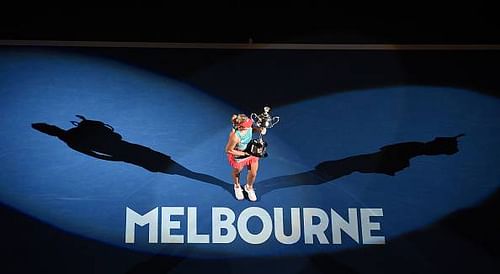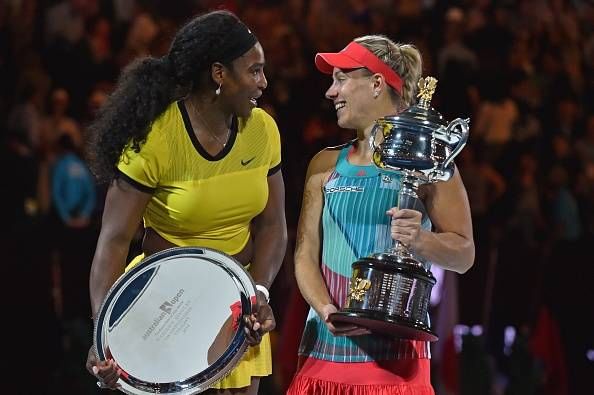
Australian Open diary: Angelique Kerber and Serena Williams, or the improbable virtue of belief
‘Belief’ is a strong word, and is one of the go-to answers whenever an athlete is questioned about the reason for his or her unexpected victory. But how big a role does belief really play in an upset? Is it all about having faith in yourself, is or it about developing the special skills required to put a champion off her game? And is some of it also down to plain dumb luck?
While Angelique Kerber believed that she could defeat Serena Williams in the final of the 2016 Australian Open, she was probably the only one in the arena who did. And that's because, for one thing, luck didn't seem to be on her side – Serena had never lost an Australian Open after reaching the semis. Kerber didn't seem to have the game to topple the American either; how much retrieving can you really do when Serena is belting the ball with a violent force that defies the laws of physics?
But while none of us were looking, Kerber had improved her serve – throughout the tournament she repeatedly talked about the work she had put into the shot during the off-season. She had also learned to be a bit more aggressive in her court positioning, and a little more consistent with her down-the-line forehand. She was as quick and dogged as ever with her baseline defence, but the overall package was infinitely more impressive now than it was before 2016.
Even with all that, Serena still would have had to take her eye off the ball to produce an upset. And that's exactly what she did at the start of the match, as she sent several routine forehands long. The World No. 1 seemed a little surprised by Kerber’s ability to hang in the baseline rallies and also by her annoying tendency to get every ball back, so she tried to rush the points and pull the trigger early.
By the time Serena truly realised what she was facing, it was too late to save the set. The American’s first ear-splitting ‘Come on!’ didn't arrive until about the fifth game, and her forehand didn't really find its range until Kerber was serving for the set. But with Kerber hitting her spots with the serve – the German served just two aces less than Serena in the match, and shockingly won a higher percentage of first serve points than the top seed – the patented Serena comeback was snuffed out even before it began.
As Kerber took the set 6-4, I thought to myself that this was already the best Slam final performance by an opponent of Serena's in a long, long time. But the German hadn't brought out her best stuff yet. While Serena stormed through the second set in a hail of big hitting and fierce fist-pumps, Kerber was clearly proving to be a pesky opponent. The pivotal moment of the match came, I thought, in the seemingly inconsequentional game with Kerber serving at 2-5 in the second.
The German quickly went 0-30 down as Serena sensed the finish line was near. But rather than handing over a second break and allowing Serena to serve first in the third, Kerber decided to throw the kitchen sink at her opponent and see where the chips fell. She unleashed a series of big serves and big groundstrokes to hold, and although Serena closed out the set in the next game, Kerber had shown with her last stand that she wasn't going away yet.
If Serena had won that game to take the set 6-2, would she have been more confident in the third, staying true to her history? After the match Kerber was asked whether she knew that the American had never before lost a three-set match in a Slam final. That's an impressive record, and a mark of just how great a fighter Serena is. But fortunately for the German, she didn't know about that stat; without the burden of history on her shoulders, she could draw inspiration from her first set performance and continue to believe that victory was possible.
Kerber broke early again in the third set, which was when the tension really started to shoot up in the arena. For the first time, an upset seemed distinctly possible; Serena didn't look guaranteed to sort it all out by the end, as she usually does. Every point that Kerber won was now greeted with wild cheers, and every error that Serena made was met with sighs of disbelief. And while the American tried to rouse herself through her typical self-exhortations and loud grunting between points, Kerber's stoic demeanour provided the perfect balance for a high-wire drama.
Kerber's stone-faced resilience was both endearing and exasperating at the same time. She garnered more support than Serena from the crowd, but that could possibly be because they felt she needed some kind of shake-up to fight back against Serena's screams. At one point a guy from the stands even shouted, “Marry me Kerber!” – a throwback to the legendary episode involving Kerber's legendary countrywoman Steffi Graf.
But there was to be no tongue-in-cheek response from Kerber. She was here to do a job, perhaps the toughest job in the whole world, and she wasn't about to let marriage proposals come in her way. Kerber didn't so much as give a half-glance to the zealous suitor; instead, she proceeded to busy herself with the ball, and launched into another one of her back-and-forth sprints trying to retrieve the blasts emanating from Serena's racquet.
Kerber was on the defensive for large stretches of the match, but this wasn't your usual backboard-style retrieving. You could see the changes in pace and spin that she was imparting even when she was on the dead run, which kept forcing Serena to change her plan of attack, ultimately leading to errors. Kerber's crosscourt passing shots in particular were struck with pinpoint accuracy and lethally dipping spin, which reminded us of another famous lefty with insane retrieving skills – Rafael Nadal.
That said, Serena's volleys were thoroughly subpar on the night. She didn't seem sure whether to go right up to the net for a drop volley or stay mid-court for a swing volley, and ultimately was caught in no-man's land on several occasions. She even seemed unwilling to cover the crosscourt pass – maybe Kerber's left-handedness had something to do with that – and was frequently caught off-guard.
The one time that she did anticipate the crosscourt pass, she ended up on the wrong side of a net-cord: Kerber's shot hit the tape and led to Serena taking comically evasive action. Crucially, however, Serena lost the point; is this what you call it not being ‘your day'?
Everything reached a tipping point in the sixth game of the third set, which went to multiple deuces and in hindsight proved to be the game-changer. Serena saved a couple of break points with some bold play – including one backhand that grazed the outside of the line for a winner – but also made two double faults to hand the initiative back. The biggest risks in the game, however, were taken by Kerber.
Twice Serena had game point, and twice Kerber conjured the perfectly executed drop shot to bring the score back to deuce. Those two drop shots were so well-orchestrated, and so unexpected, that they drew gasps from the audience and looks of helpless dismay from Serena. The American even referred to them in her press conference, when she was asked what went wrong in that all-important game.
“She had some great dropshots, twice. You know, they were great. They were just unexpected because she hadn't hit any until the third set. So that's it. I definitely could have got them. I'm really fast. But I just wasn't able to read that one in time,” she said matter-of-factly.
It takes inspiration and desperation in equal measure to create a truly memorable event. That sixth game had inspiration by way of Kerber's perfect drop shots, and desperation by way of Serena's double faults. The World No. 1 did come back from that setback to reduce a 5-2 deficit to 5-4, but serving behind was always going to be a difficult proposition with the trophy on the line.
Fittingly, the match ended with one last dipping pass from Kerber, and one last volley error from Serena. The German immediately dropped to the court and covered her face in disbelief, and a lot of people in the crowd were tempted to do the same. Her moment of shock and happiness was hard not to identify with; as she had run tirelessly all over the court trying to defuse Serena's bombs, she had become like one of us, fighting the odds and hoping for the best.
But Kerber is now a Grand Slam champion, unlike any of us in the crowd, beause she has a few things that we don't – an endless reserve of energy, a cerebral understanding of on-the-run shot placement, and an unshakeable belief in herself.
“The mental part, it's really big,” Kerber said after the match. “I was able to see it also. I mean, you must be relaxed and you must really believe in yourself. This is actually the biggest thing what I learn also in these two weeks, to go for it. Of course you will have some loses in your career, as well, and also tough moments still.
“But, you know, you must believe that you can do it.”
Kerber's belief helped her get a strong start to the match, which in turn led to Serena rushing into errors, which in turn gave Kerber the confidence to go for her shots, which in the end proved too much for Serena to handle. It's all part of the sporting cycle, and it has scarcely been as starkly represented as it was today.
And oh, along the way the German had a bit of luck too – she was helped by more than one net cord, and the typically unpredictable Melbourne rain came battering down just minutes after her victory. If there had been a rain break which had necessitated the closing of the roof, would we be looking at a different result?
You create your own luck, the saying goes. There's also the other one that says “Fortune favours the brave”. Kerber was both brave and creative today, so her win should perhaps not be as shocking as it seems to us right now. But how could we have known that she'd be all of these things today?
How could we have known that she'd have believed in herself?

